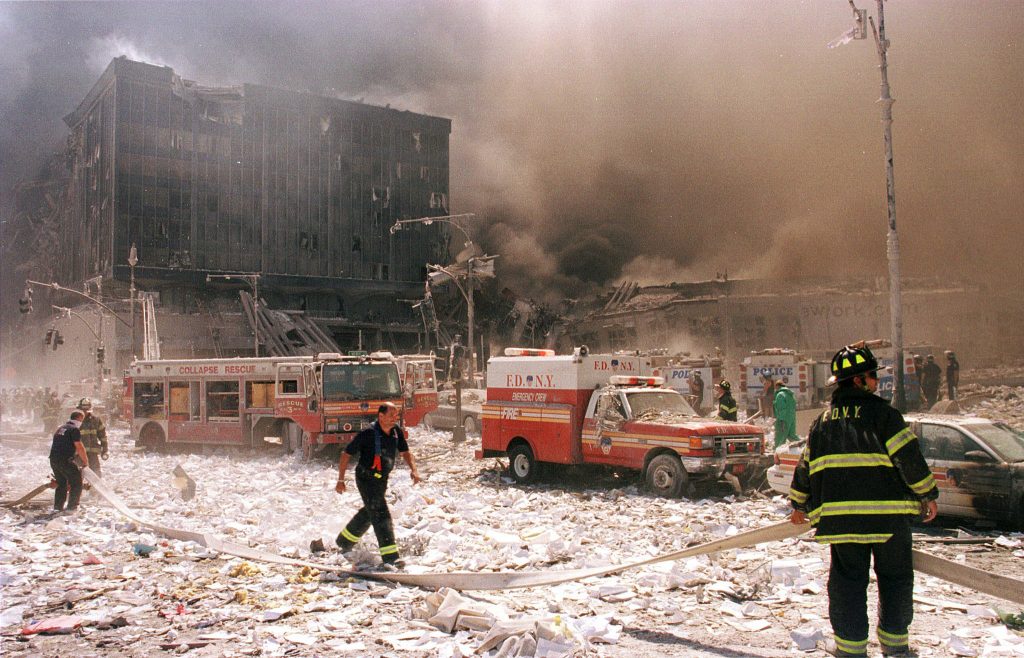
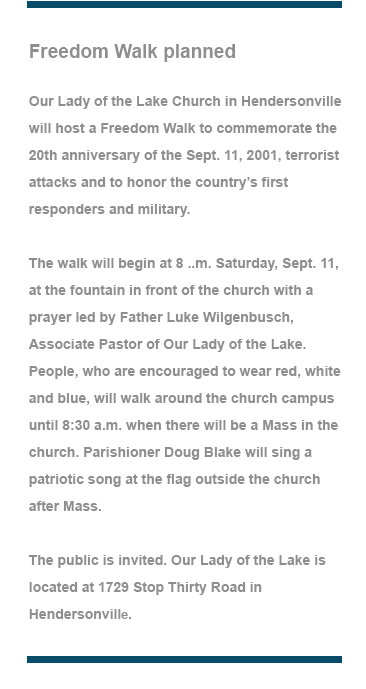
On Sept. 11, 2001, Americans across the country watched not only buildings collapsing, planes crashing and fires raging, but instances of rare courage from people who ran, not away from the terrible scenes, but into the smoke and flames to save who they could.
It was firefighters, paramedics and police officers in New York and soldiers, sailors, Marines and civilians at the Pentagon in Washington.
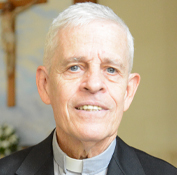
“Due to the training and commitment, they unhesitatingly went into harm’s way, as we do today,” said Deacon Jim Holzemer of St. Ann Church, who retired from the Nashville Fire Department in 2012 after 38 years on the job. “You can have elements of fear, but because you’re in a community and you have people who have your back, you go forward. That’s the essence of public safety.”
Deacon Holzemer, who had started as the Nashville Fire Department’s first paramedic in 1974 and rose through the ranks to become an assistant chief when he retired, watched the events of 9/11 unfold on television with the rest of the country.
“I think I was coming off a shift” when he heard about the attacks, he said. “We were called back to a meeting to discuss the ramifications for Nashville.
“You were mesmerized totally and thought, ‘Dear God, what might I do if I was faced with that,’” Deacon Holzemer said. “Watching a building fall in front of you … I can’t imagine.”
Tommy Ragsdale and Josh Borum watched the events of the day with their classmates at Father Ryan High School.
“I was in the library at Father Ryan, chatting with some friends,” recalled Borum, who today is a Metro Nashville Police officer. “They ran down and told us to watch the TV that was down there.”
Ragsdale was between Carol Brewer’s English class and Doug Bontrager’s math class when word of the attack began to filter through the school. Father Joe McMahon, then the school’s campus minister, came on the public address system to inform the faculty and students of the situation and to pray.
“For the rest of the day, we didn’t really have class,” Ragsdale said, as teachers instead brought televisions into their classrooms. “I remember watching it unfold the rest of the day.”
‘I was ready to go’
For Borum and Ragsdale, the ramifications of 9/11 on their lives was direct. Borum had already enlisted in the Marine Corps under the delayed entry program, waiting to ship out for boot camp after his high school graduation the following May.
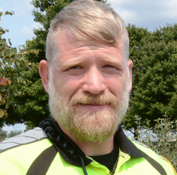
“That afternoon I went to the recruiting office,” said Borum, who grew up in St. Joseph Parish in Madison and graduated from the elementary school there. “I went down there to try to fast track my ship out date” with the idea that he could receive a GED while in the Marines. “I was ready to go.”
But the Marine Corps recruiters advised him to stay in school and graduate as he originally planned.
“9/11 made us angry,” Ragsdale said. “There’s a shock and then there’s an anger.”
Ragsdale also was already planning a military career before 9/11. “I had received my acceptance to the Naval Academy the week earlier,” said Ragsdale, then a senior. “That kind of changed the perspective of going there.”
Throughout their senior year, Ragsdale, Borum and their classmates who also were headed to the military were talking about their future, which now included the very real prospect of combat. “Senior year was a lot more purposeful,” Ragsdale said.
“I knew I had four years at the Academy in front of me,” said Ragsdale, who graduated from the U.S. Naval Academy at Annapolis in 2006 and was commissioned as an officer in the Marine Corps. “We didn’t know how long these activities were going to last. It made you look at all the things you were going to do differently.”
‘It really did color everything’
As the first class to enter the Naval Academy after 9/11, Ragsdale said, “without a doubt, it changed how we approached our lives as Midshipmen. … It really did color everything.”
After serving four years in the Marines, Borum returned to Nashville and joined the Army National Guard. It was with his Guard unit that he deployed to Iraq in 2009-10 to provide convoy security. “I was a gunner for one of my trucks,” Borum said.
Ragsdale deployed to Afghanistan 10 years after 9/11 as a fighter jet pilot providing close air support for Marines on the ground. “The majority of what we were doing was supporting Marines on the ground who were trying to maintain peace and stability.”
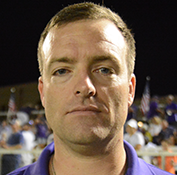
The Marines were involved with some economic development projects to help the Afghan people, he said. “At the time, those things were working.”
But those gains proved short-lived, Ragsdale said, “just because of how different things are there.”
The events of 9/11 impacted the Nashville Fire Department as it did public safety agencies across the nation, Deacon Holzemer said.
“By the time of 9/11 you had the understanding you had to be ready for anything,” he said, noting previous terrorist attacks such as the 1993 bombing at the World Trade Center and the Oklahoma City bombing in 1995. After 9/11, the planning for such events increased “dramatically,” he added.
‘It’s a little frustrating’
The unity the country displayed immediately after 9/11 has dissolved in the ensuing years.
“As we all remember, immediately in the aftermath there was a groundswell of patriotism,” said Ragsdale, a parishioner at Christ the King Church in Nashville. “Anything that lasts 20 years, you can’t hold that. The burden is not borne broadly. It lets people forget.”
Military operations immediately after 9/11 were focused on Afghanistan and tracking down al Qaeda, which had carried out the attacks. “Because of the way we fight wars these days, people didn’t really care about Afghanistan after March 2003 when we invaded Iraq,” Ragsdale said.
Watching the end of the war in Afghanistan in recent weeks, “for someone like me, there’s a lot of conflicting emotions,” said Ragsdale, who after leaving the Marines returned to Nashville, started a business and joined the Air Force Reserves. “There was an air of inevitability, but that doesn’t mean it doesn’t introduce other emotions.”
“It’s a little frustrating,” Borum admitted, thinking of friends who died fighting in Iraq and Afghanistan. “All of that was for nothing.”
‘About more than themselves’
But a change that has endured is people’s appreciation for the work of first responders.
“It’s seared into the psyche of Americans,” Deacon Holzemer said. “In the horrifying event we saw what they do. They’re about more than themselves.”
The events of 9/11 deepened Deacon Holzemer’s faith and spirituality.
“There’s no doubt that that was one of the things that made me very suddenly think about the ministry,” Deacon Holzemer said. “The spirituality without a doubt was more conscious.”
Seeing the toll on the firefighters who responded to the 9/11 attacks reminded him, “The next run could be the last. This could happen here,” Deacon Holzemer said.
Besides his duties at St. Ann, Deacon Holzemer serves as a chaplain for the Nashville Fire Department. He likes to hand out to firefighters and paramedics cards he makes with prayers such as “I don’t know what the next call will bring, dear Lord ride with me.”
“Faith helps in the job,” said Deacon Holzemer. “Paramedics and firefighters are doing the corporal works of mercy.”









